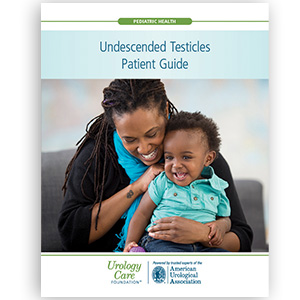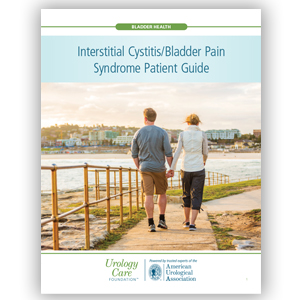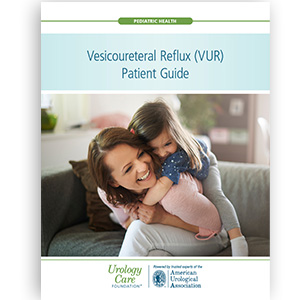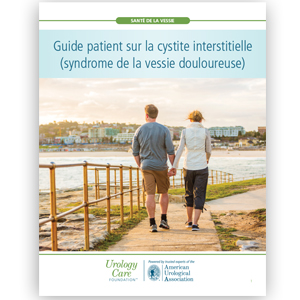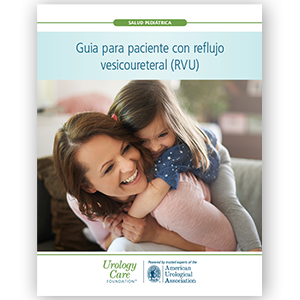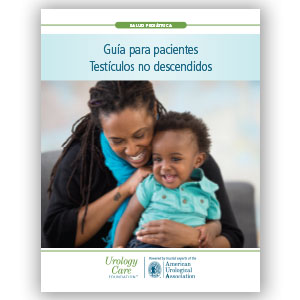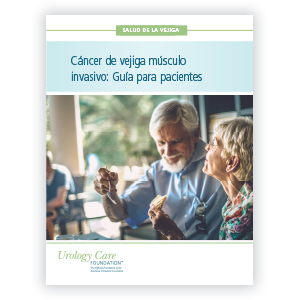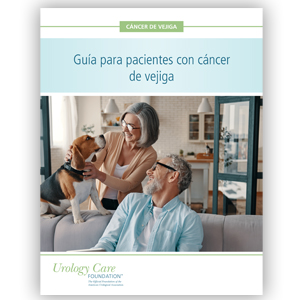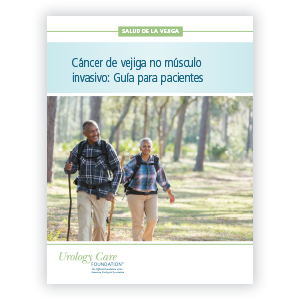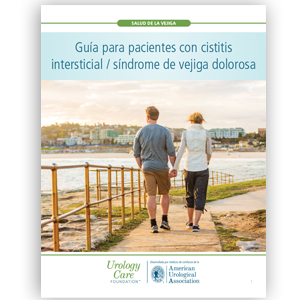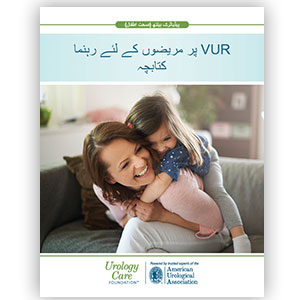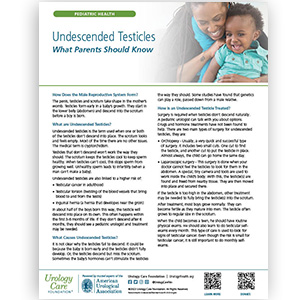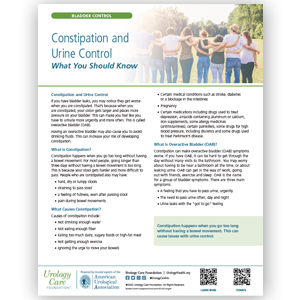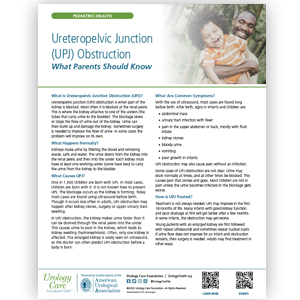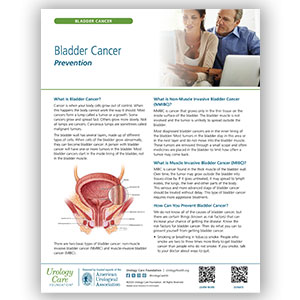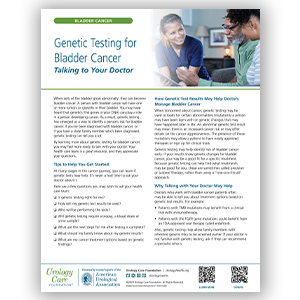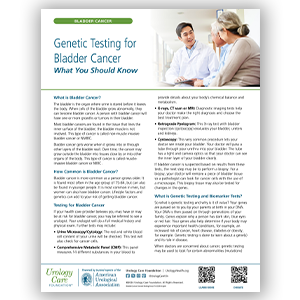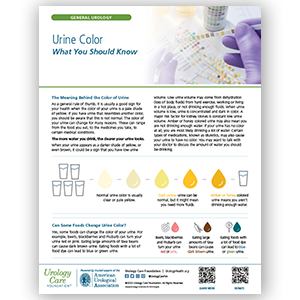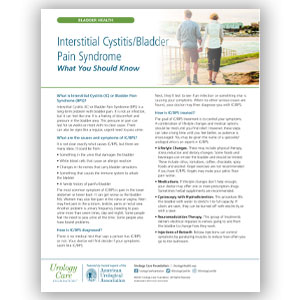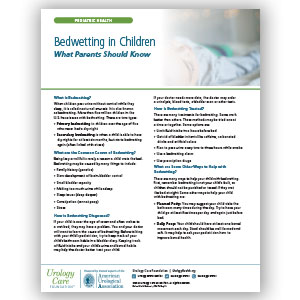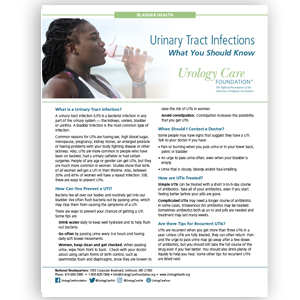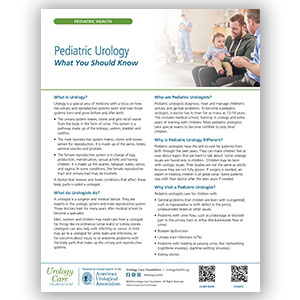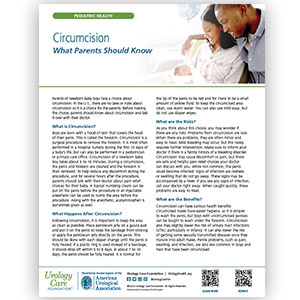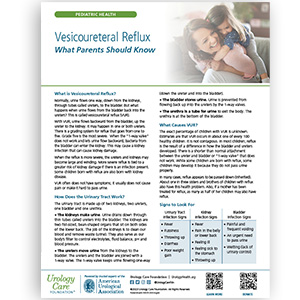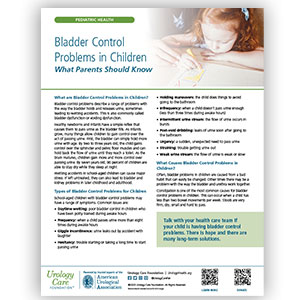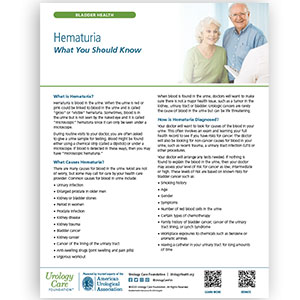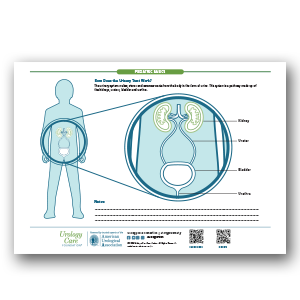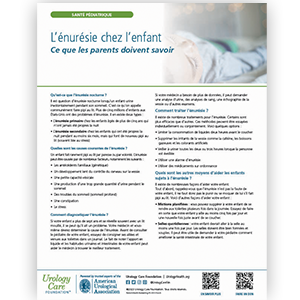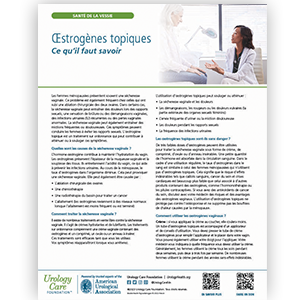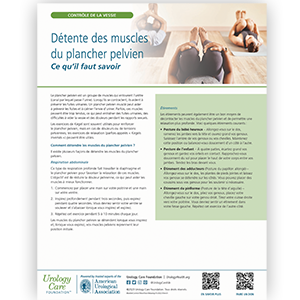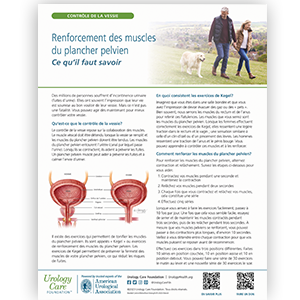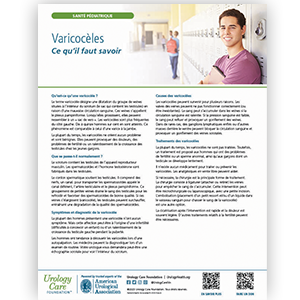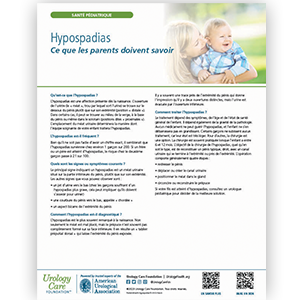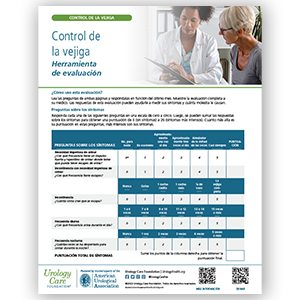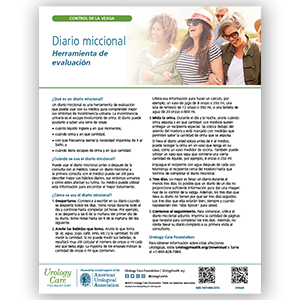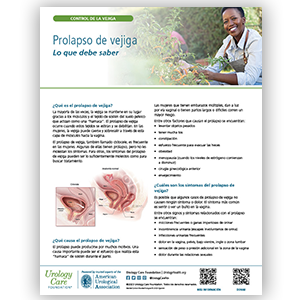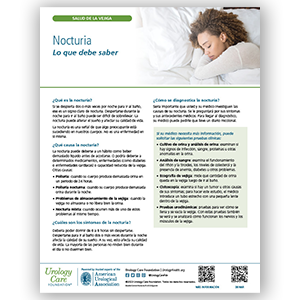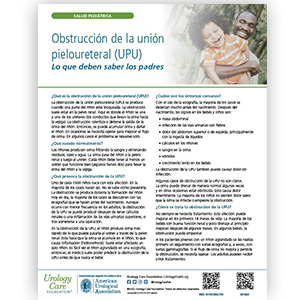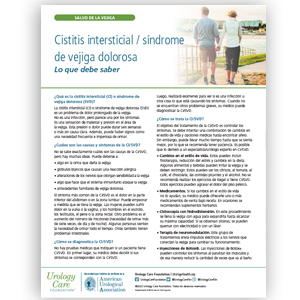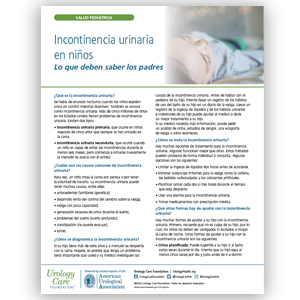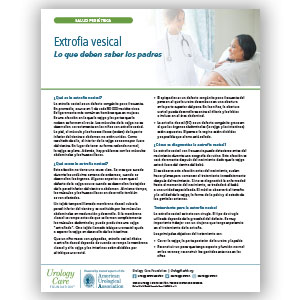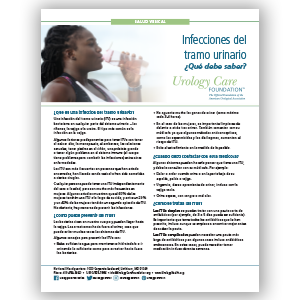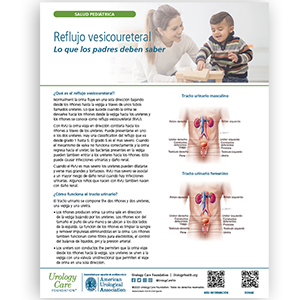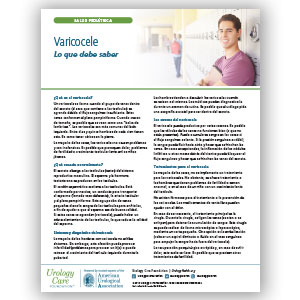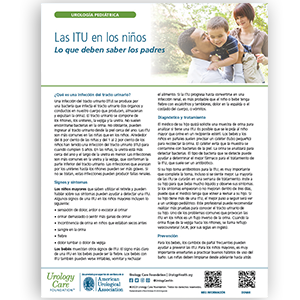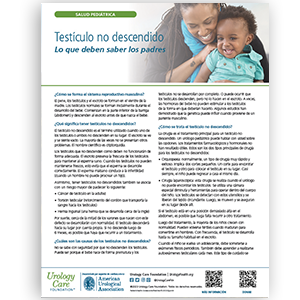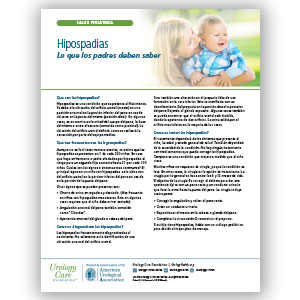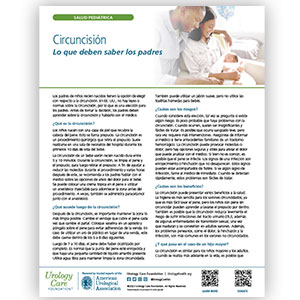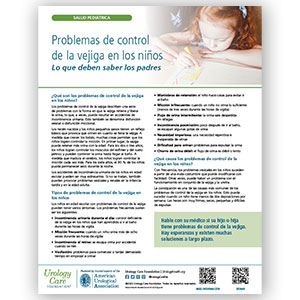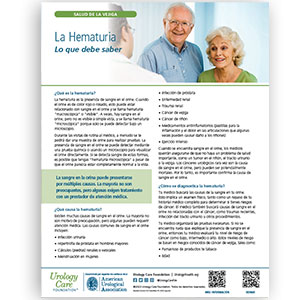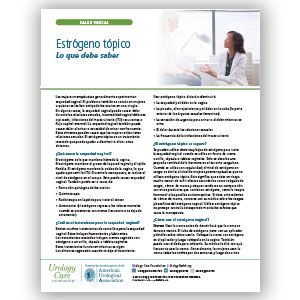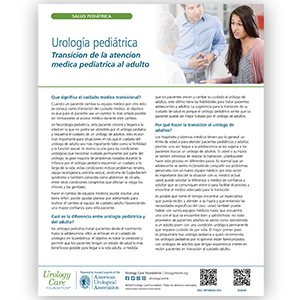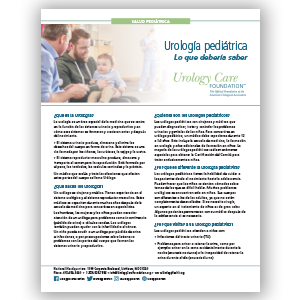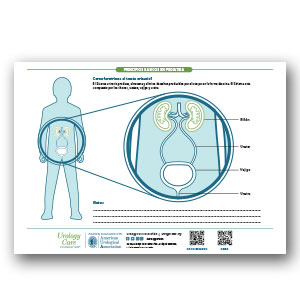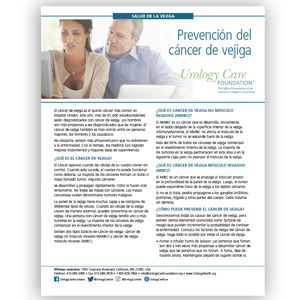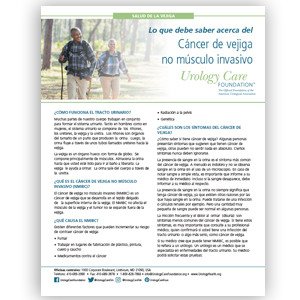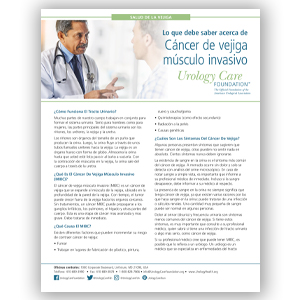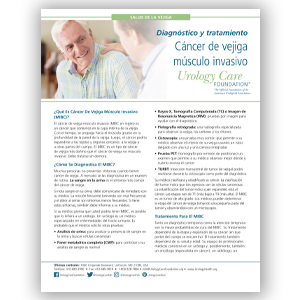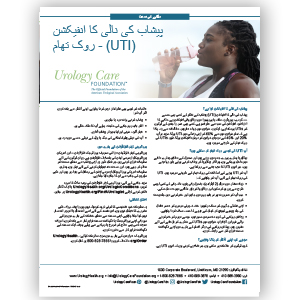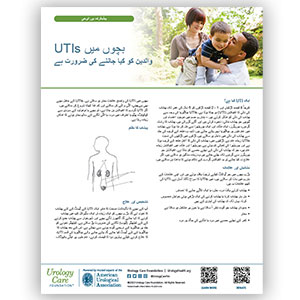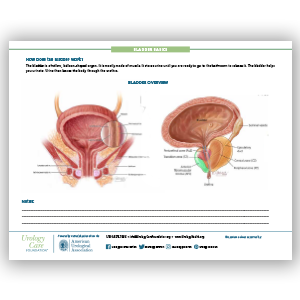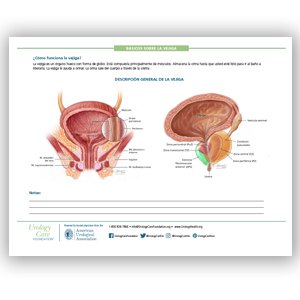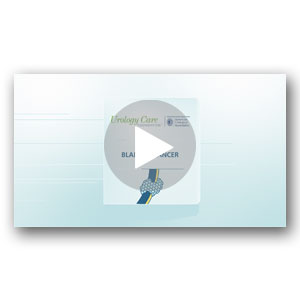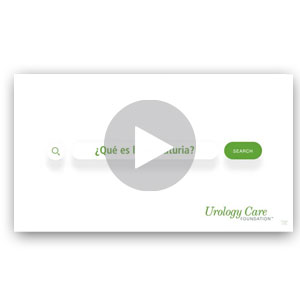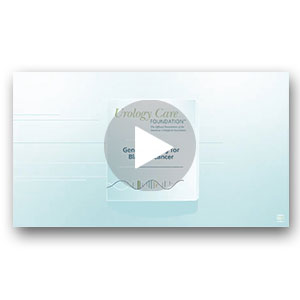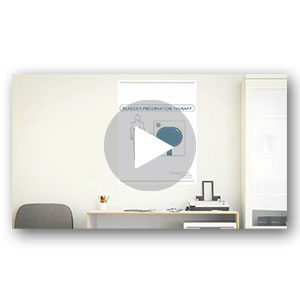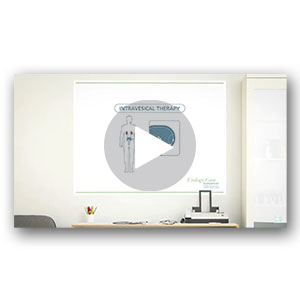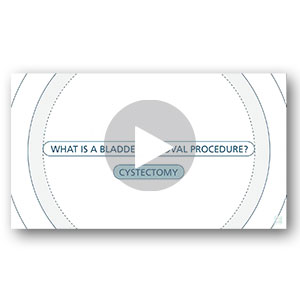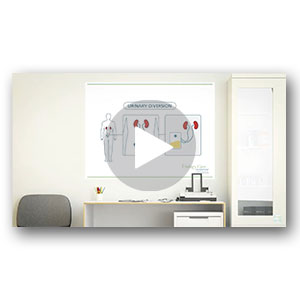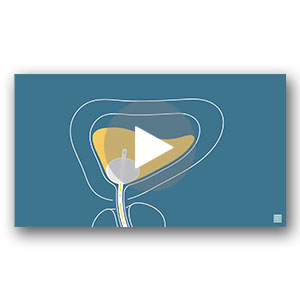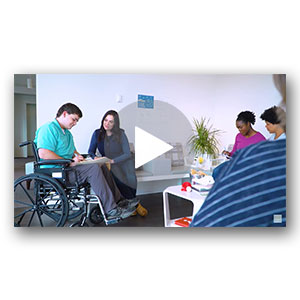Bladder Cancer Patient Guide
Guide with information about how to diagnose, treat and manage bladder cancer, including a patient perspective.… more
Living Healthy Cookbook with Information about Urologic Cancers
Part of managing cancer includes a healthy diet and lifestyle. This educational cookbook has recipes from celebrity chefs and is designed to help those affected by urologic cancers.… more
Living Healthy Cookbook with Information about Urologic Cancers
Part of managing cancer includes a healthy diet and lifestyle. This educational cookbook has recipes from celebrity chefs and is designed to help those affected by urologic cancers.… more
Interstitial Cystitis/Bladder Pain Syndrome (IC/BPS)
Download this patient guide to learn more information about IC/BPS and the urinary tract.… more
Guide patient sur la cystite interstitielle (syndrome de la vessie douloureuse)
La cystite interstitielle (CI), ou syndrome de la vessie douloureuse (SVD), est un problème de douleur vésicale chronique. Cela peut évoquer une infection de la vessie ou infection urinaire, mais ce n’en est pas une. Il s’agit d’une sensation d’inconfort et de pression dans la région de la vessie qui dure six semaines ou plus, sans infection ni autre cause évidente. (Patient Guide to Interstitial Cystitis (Painful Bladder Syndrome))… more
Guía para pacientes de VUR
El VUR se puede detectar antes de que nazca el niño. Pero comúnmente se diagnostica cuando un niño joven desarrolla una infección del tracto urinario. El VUR es poco frecuente en los niños mayores y los adultos. Alrededor de tres de cada cuatro pequeños que reciben tratamiento por VUR son niñas. (Vesicoureteral Reflux (VUR) Patient Guide)… more
Guía para pacientes: Testículos no descendidos
El testículo no descendido es el término utilizado cuando uno de los testículos o ambos no descienden al escroto. El pediatra del bebé puede detectar esto durante un examen de rutina. El escroto se ve y se siente vacío. (Undescended Testicles Patient Guide)… more
Cáncer de vejiga músculo invasivo: Guía para pacientes
Cómo diagnosticar, tratar y controlar el cáncer de vejiga invasivo muscular, incluida la perspectiva del paciente. (Muscle Invasive Bladder Cancer Patient Guide)… more
Guía para pacientes con cáncer de vejiga
Esta guía le informará sobre el cáncer de vejiga y lo que puede hacer al respecto. (Bladder Cancer Patient Guide)… more
Cáncer de vejiga no músculo invasivo: Guía para el paciente
Cómo diagnosticar, tratar y manejar el cáncer de vejiga invasivo no muscular, incluida la perspectiva del paciente. (Non-Muscle Invasive Bladder Cancer Patient Guide) … more
Guía para pacientes con vejiga hiperactiva
En esta guía, se proporciona información sobre cómo lidiar con la OAB. Si cree que precisa ayuda, solicítela, aunque le resulte incómodo. No espere, ya que existen muchos tratamientos efectivos para la OAB. (Overactive Bladder Patient Guide)… more
Guía para pacientes con cistitis intersticial / síndrome de vejiga dolorosa
Muchas personas tardan meses o incluso años en recibir un diagnóstico de cistitis intersticial (CI) o síndrome de vejiga dolorosa (SVD), los nombres médicos para el complejo de síntomas que incluyen dolor en la vejiga, necesidad imperiosa de orinar y aumento del número de micciones. (Interstitial Cystitis/Bladder Pain Syndrome Patient Guide)… more
کتابچہپر مریضوں کے لئے رہنما
بچے کو پیدائش سے پہلے بھی VUR میں مبتلا پایا جا سکتا ہے۔ لیکن اس کی عموماً، تشخیص اس وقت ہوتی ہے جب ایک چھوٹے بچے کو پیشاب کی نالی میں انفیکشن ہو جاتا ہے۔ VUR بڑے بچوں اور بڑے افراد میں کم ہی ہوتا ہے۔ VUR کے لئے علاج کرانے والے ہر 4 بچوں میں سے 3 لڑکیاں ہیں۔ (Vesicouretal Reflux (VUR) Patient Guide)… more
ضعف ضبط - تناؤ کے سبب پیشاب کے ضعف ضبط پر مریضوں کے لئے رہنما کتابچہ
پیشاب کا ضعف ضبط مثانے پر ضبط اختیار کرنے کا ایک مسئلہ ہے، جس کی وجہ سے پیشاب خارج ہو جاتا ہے۔ متحدہ امریکہ میں لاکھوں افراد اس مسئلے کے ساتھ رہتے ہیں۔ یہ مردوں، خواتین اور بچوں کو اپنی پسند کے کام کرنے سے روکتا ہے۔ آپ باتھ روم سے دور ہونے کا ڈر کے بارے میں ہی سوچتے (Stress Urinary Incontinence Patient Guide)… more
ضعف ضبط پر مریضوں کے لیےرہنما کتابچہ
امریکہ میں لاکھوں افراد ضعف ضبط اور مثانے کے کنٹرول کی علامات کےساتھ زندگی بسر کرتے ہیں۔ یہ مردوں، خواتین اور بچوں کو وہ زندگی گزارنےسے روک سکتا ہے جس کی وہ خواہش رکھتے ہیں۔ باتھ روم سے دور ہونےکا خوف روزمرہ کی زندگی کے انتخابات کو محدود کر سکتا ہے۔ (Incontinence Patient Guide)… more
پیش فعال مثانہ پر مریضوںکے لئے رہنما کتابچہ
یہ گائیڈ انتظام کرنے کے طریقے کے بارے میں معلومات فراہم کرتا ہے او اے بی۔ (Overactive Bladder Patient Guide)… more
UrologyHealth extra® – Bladder Cancer Special Issue
Order this special issue focusing on bladder cancer to be shipped free in the United States and includes information for patients and caregivers on the basics such as the stages of this cancer, symptoms, treatments, risk factors and how to learn more.… more
UrologyHealth extra® – Bladder Cancer Special Issue
Download this special issue focusing on bladder cancer that includes information for patients and caregivers on the basics such as the stages of this cancer, symptoms, treatments, risk factors and how to learn more.… more
Constipation and Urine Control - What You Should Know Fact Sheet
This fact sheet outlines what to know about constipation and urine control. Constipation happens when you go too long without having a bowel movement & this can cause issues with urine control. … more
Constipation and Urine Control: What You Should Know
Order this fact sheet that outlines what to know about constipation and urine control. Constipation happens when you go too long without having a bowel movement & this can cause issues with urine control. … more
Ureteropelvic Junction (UPJ) Obstruction - What Parents Should Know Fact Sheet
Learn about Ureteropelvic Junction (UPJ) Obstruction, its causes, symptoms and common treatments.… more
Topical Estrogen – What You Should Know Fact Sheet
Women who have gone through menopause often have vaginal dryness. This problem is also common in those who have had both of their ovaries surgically removed. In some cases, vaginal dryness can lead to pain with sex, burning vaginal discomfort or itching, recurrent urinary tract infections (UTIs) or abnormal vaginal discharge. Topical estrogen is a prescription treatment that can help lower or ease these symptoms.… more
Bladder Exstrophy – What Parents Should Know Fact Sheet
Bladder exstrophy is a rare birth defect. On average, it occurs in about 1 out of every 50,000 live births. It is slightly more common in males than females. It is a condition where the bladder and parts around it form inside-out. … more
Bladder Cancer: What You Should Know
Learn more about the basics of bladder cancer including types, causes, symptoms, testing and treatment options. … more
Genetic Testing for Bladder Cancer – Talking to Your Doctor
Learn more about genetic testing for bladder cancer and how to prepare as a way to feel more ready to talk with your doctor.… more
Genetic Testing for Bladder Cancer - What You Should Know
A description about genetic testing for bladder cancer and how genetic test results may help patients make informed choices.… more
Urine Color - What You Should Know
A fact sheet about the meaning behind the color of urine for people of all ages to know when to drink more, what can change urine color and when to talk with a doctor about urine color.… more
Interstitial Cystitis/Bladder Pain Syndrome (IC/BPS) Fact Sheet
Download this fact sheet to read a concise review of interstitial cystitis/bladder pain syndrome.… more
Hypospadias – What Parents Should Know
A short summary of Hypospadias, including signs, diagnosis, treatments and questions to ask your child’s doctor.… more
Varicoceles - What You Should Know
Designed for teen boys and men to explain this condition, causes, treatments and address frequently asked questions.… more
Bedwetting in Children: What Parents Should Know Fact Sheet
Download this fact sheet.… more
Urinary Tract Infections - What You Should Know
A description of urinary tract infections to include tips on how to prevent UTIs.… more
Pediatric Urology - Transitioning from Pediatric to Adult Care
Download this fact sheet. … more
Pediatric Urology Basics
The basics about urinary function in children with notes section to help patients, parents and health care teams.… more
L’énurésie chez l’enfant: Ce que les parents doivent savoir
Il est question d’énurésie nocturne lorsqu’un enfant urine involontairement pendant son sommeil. C’est ce qu’on appelle communément faire pipi au lit. Plus de cinq millions d’enfants aux États-Unis ont des problèmes d’énurésie. (Bedwetting – What Parents Should Know Fact Sheet)… more
OEstrogènes topiques: Ce qu’il faut savoir
Les femmes ménopausées présentent souvent une sécheresse vaginale. Ce problème est également fréquent chez celles qui ont subi une ablation chirurgicale des deux ovaires. Dans certains cas, la sécheresse vaginale peut entraîner des douleurs lors des rapports sexuels, une sensation de brûlure ou des démangeaisons vaginales, des infections urinaires (IU) récurrentes ou des pertes vaginales anormales. (Topical Estrogen – What You Should Know Fact Sheet)… more
Détente des muscles du plancher pelvien: Ce qu’il faut savoir
Un plancher pelvien musclé peut aider à prévenir les fuites et à calmer l’envie d’uriner. Parfois, ces muscles peuvent être trop tendus, ce qui peut entraîner des fuites urinaires, des difficultés à vider la vessie et des douleurs pendant les rapports sexuels. (Pelvic Floor Muscle Relaxing – What You Should Know Fact Sheet)… more
Renforcement des muscles du plancher pelvien: Ce qu’il faut savoir
Des millions de personnes souffrent d’incontinence urinaire (fuites d’urine). Elles ont souvent l’impression que leur vie est soumise au bon vouloir de leur vessie. Mais ce n’est pas une fatalité. Vous pouvez agir dès maintenant pour mieux contrôler votre vessie. (Pelvic Floor Muscle Strength – What You Should Know Fact Sheet)… more
Varicocèles: Ce qu’il faut savoir
Le terme varicocèle désigne une dilatation du groupe de veines situées à l’intérieur du scrotum (le sac qui contient les testicules) en raison d’une mauvaise circulation sanguine. (Varicoceles – What You Should Know Fact Sheet)… more
Control de la vejiga Herramienta de evaluación
Lea las preguntas de ambas páginas y respóndalas en función del último mes. Muestre la evaluación completa a su médico. Las respuestas de esta evaluación pueden ayudarle a medir sus síntomas y cuánta molestia le causan. (Bladder Control Assessment Tool)… more
Diario miccional Herramienta de evaluación
Un diario miccional es una herramienta de evaluación que puede usar con su médico para comprender mejor sus síntomas de incontinencia urinaria. (Bladder Diary Assessment Tool)… more
Prolapso de vejiga Lo que debe saber
La mayoría de las veces, la vejiga se mantiene en su lugar gracias a los músculos y el tejido de sostén del suelo pélvico que actúan como una “hamaca”. El prolapso de vejiga ocurre cuando estos tejidos se estiran y se debilitan. En las mujeres, la vejiga puede caerse y sobresalir a través de esta capa de músculos hacia la vagina. (Bladder Prolapse – What You Should Know Fact Sheet)… more
Nocturia Lo que debe saber
Si se despierta dos o más veces por noche para ir al baño, ese es un signo claro de nocturia. Despertarse durante la noche para ir al baño puede ser difícil de sobrellevar. La nocturia puede alterar el sueño y afectar su calidad de vida. La nocturia es una señal de que algo preocupante está sucediendo en nuestros cuerpos. No es una enfermedad en sí misma. (Nocturia – What You Should Know Fact Sheet)… more
Obstrucción de la union pieloureteral (UPU) - Lo que deben saber los padres
La obstrucción de la unión pieloureteral (UPU) se produce cuando una parte del riñón está bloqueada. La obstrucción suele estar en la pelvis renal. (Ureteropelvic Junction (UPJ) Obstruction - What Parents Should Know Fact Sheet)… more
Cistitis intersticial / síndrome de vejiga dolorosa: Lo que debe saber
La cistitis intersticial (CI) o síndrome de vejiga dolorosa (SVD) es un problema de dolor prolongado de la vejiga. No es una infección, pero parece una por los síntomas. Es una sensación de malestar y presión en el área de la vejiga. (Interstitial Cystitis/Bladder Pain Syndrome – What You Should Know Fact Sheet)… more
Incontinencia urinaria en niños: Lo que deben saber los padres
Se habla de enuresis nocturna cuando los niños expiden orina sin control mientras duermen. También se conoce como incontinencia urinaria. (Bedwetting in Children: What Parents Should Know Fact Sheet)… more
Extrofia vesical - Lo que deben saber los padres
La extrofia vesical es un defecto congénito poco frecuente. En promedio, ocurre en 1 de cada 50 000 nacidos vivos. Es ligeramente más común en hombres que en mujeres. Es una afección en la que la vejiga y las partes que la rodean se forman al revés. (Bladder Exstrophy – What Parents Should Know Fact Sheet)… more
Infecciones del tramo urinario ¿Qué debe saber?
Una infección del tramo urinario (ITU) es una infección bacteriana en cualquier parte del sistema urinario – los riñones, la vejiga o la uretra. El tipo más común es la infección en la vejiga. (Urinary Tract Infections - What You Should Know Fact Sheet)… more
Reflujo vesicoureteral - Lo que los padres deben saber
Con RVU la orina viaja en dirección contraria hacia los riñones a traves de los ureteres. Puede presentarse en unoo los dos ureteres. Hay una classification del reflujo que va desde grado 1 hasta 5. El grado 5 es el mas severo. (Vesicoureteral Reflux (VUR) - What Parents Should Know Fact Sheet)… more
Varicocele: Lo que debe saber
Un varicocele se forma cuando el grupo de venas dentro del escroto (el saco que contiene a los testículos) se agranda debido al flujo sanguíneo insuficiente. Estas venas conforman el plexo pampiniforme. (Varicoceles: What You Should Know Fact Sheet)… more
Las ITU en los niños: Lo que deben saber los padres
Una infección del tracto urinario (ITU) se produce por una bacteria que infecta el tracto urinario (los órganos y conductos en nuestro cuerpo que producen, almacenan y expulsan la orina). El tracto urinario se compone de los riñones, los uréteres, la vejiga y la uretra. (UTIs in Children - What Parents Should Know Fact Sheet)… more
Testículo no descendido: Lo que deben saber los padres
El testículo no descendido es el término utilizado cuando uno de los testículos o ambos no descienden en su lugar. El escroto se ve y se siente vacío. La mayoría de las veces no se presentan otros problemas. El nombre científico es criptorquidia. (Undescended Testicles: What Parents Should Know Fact Sheet)… more
Hipospadias: Lo que los padres deben saber
El hipospadias es una afección presente desde el nacimiento. Sucede cuando la abertura de la uretra (el orificio por donde sale la orina) se encuentra en la parte inferior del pene en lugar de estar en la punta. La ubicación de la abertura de la uretra servirá para decidir la forma en que el equipo de cuidados de su hijo solucionará el inconveniente. (Hypospadias: What Parents Should Know Fact Sheet)… more
Circuncisión: Lo que deben saber los padres
Los padres de niños recién nacidos tienen la opción de elegir con respecto a la circuncisión. En EE. UU., no hay leyes o normas sobre la circuncisión, por lo que es una lección para los padres. Antes de tomar la decisión, los padres deben aprender sobre la circuncisión y hablarlo con el médico. (Circumcision: What Parents Should Know Fact Sheet)… more
Control de la vejiga en los niños: Lo que deben saber los padres
La disfunción vesical describe una serie de problemas con la forma en que la vejiga retiene y libera la orina, lo que, a veces, puede resultar en accidentes de incontinencia urinaria. (Bladder Control Problems in Children: What Parents Should Know Fact Sheet)… more
Hematuria: Lo que debe saber
La hematuria es la presencia de sangre en el orine. Cuando el orine es de color rojo o rosado, esto puede estarrelacionado con sangre en el orine y se llama hematuria "macroscópica" o "visible". (Hematuria: What You Should Know Fact Sheet)… more
Estrógeno tópico Lo que debe saber
Las mujeres menopáusicas generalmente experimentan sequedad vaginal. El problema también es común en mujeres a quienes se les han extirpado los ovarios en una cirugía. En algunos casos, la sequedad vaginal puede causar dolor durante las relaciones sexuales, incomodidad vaginal dolorosa o picazón, infecciones del tracto urinario (ITU) recurrentes o flujo vaginal anormal. El estrógeno tópico es un tratamiento recetado que puede ayudar a disminuir o aliviar estos síntomas. (Topical Estrogen – What You Should Know Fact Sheet)… more
Urología pediátrica - Transicion de la atencion medica pediatrica al adulto
Cuando un paciente cambia su equipo médico por otro esto se conoce como transición del cuidado médico. el objetivo es que para el paciente sea un cambio lo más simple posible sin limitaciones al acceso médico durante este cambio. (Pediatric Urology - Transitioning from Pediatric to Adult Care Fact Sheet)… more
Urología pediátrica - Lo que debería saber
La urología es un área especial de la medicina que se centra en la función de los sistemas urinario y reproductivo y en cómo esos sistemas se formaron y crecieron antes y después del nacimiento.… more
Principios Basicos en Pediatria
El Sistema urinario produce, almacena y elimina desechos producidos por el cuerpo en la forma de orina. El Sistema esta compuesto por los riñones, ureters, vejiga y uretra.… more
Prevención del cáncer de vejiga
Ayuda a los pacientes a entender cómo prevenir el cáncer de vejiga.… more
Cáncer de vejiga no músculo invasivo: Todo lo que debería saber
Un análisis conciso sobre el cáncer de vejiga no músculo invasivo que incluye síntomas y tratamiento.… more
Lo que debe saber acerca de cáncer de vejiga músculo invasivo
Una revisión de lo que debe saber sobre el cáncer de vejiga con invasión muscular.… more
Diagnóstico y tratamiento cáncer de vejiga músculo invasivo
Una revisión sobre el diagnóstico y el tratamiento del cáncer de vejiga con invasión muscular.… more
پیشاب کی نالی کے انفیکشن - روک تھام کا حقائق نامہ
پیشاب کی نالی کے انفیکشن کی تفصیل میں تجاویز شامل ہیں کہ UTIs سے کیسے بچیں۔… more
بچوں میں UTIs حقائق نامہ
ایک جامع جائزہ جس میں خاکہ پیش کیا گیا ہے کہ والدین کو پیشاب کی نالی کے انفیکشن کے بارے میں کیا جاننے کی ضرورت ہے۔ (UTIs in Children - What Parents Should Know Fact Sheet)… more
Bladder Basics
The basics about bladder function and bladder cancer with notes section to help patients and health care teams. … more
Básicos Sobre la Vejiga
La vejiga es un órgano hueco con forma de globo. Está compuesta principalmente de músculos. Almacena la orina hasta que usted esté listo para ir al baño a liberarla. La vejiga le ayuda a orinar. La orina sale del cuerpo a través de la uretra.… more
Bladder Cancer: Get the Facts
Did you know bladder cancer is the 10th most common cancer in the world? This patient education video from the Urology Care Foundation will tell you all of the facts you need about bladder cancer. … more
Infección del Tracto Urinario (ITU / UTI): Preguntas Más Comunes
Hoy vamos a responder algunas de las preguntas más frecuentes sobre infecciones de las vías urinarias (ITU). También conocidas por sus siglas en ingles "urinary tract infection" o “UTI”.… more
Obtenga la Información Sobre el Reflujo Vesicoureteral (RVU)
A medida que su hijo crece, la salud urológica es muy importante para el desarrollo general. Una condición común que afecta a los niños es el reflujo vesicoureteral. Su urólogo pediatra se referirá a esta condición como “reflujo” como un término alterno de manera corta.… more
Resección de Tumor de Vejiga con RTU
Saber que tiene un tumor de vejiga puede dar miedo. Si su médico le ha sugerido una resección transuretral de un tumor de vejiga, también conocida como RTU, este video lo ayudará a comprender el procedimiento y lo hará sentir más cómodo a medida que avanza en los siguientes pasos de su plan de tratamiento.… more
Genetic Testing for Bladder Cancer
You may have heard that genetics can play a role in a person developing cancer. As a result, genetic testing has emerged as a new way to identify a person’s risk for bladder cancer.… more
Bladder Cancer Treatment Series: Bladder Preservation
If you are a patient with muscle invasive bladder cancer, it is important to know your treatment choices. As part of your treatment, you may need to have some of your bladder removed. If this is the case, you should know your options for bladder preservation therapy.… more
Bladder Cancer Treatment: Intravesical Therapy
If you are a patient with non-muscle invasive bladder cancer, it is important to know your choices for treatment. Based on your diagnosis, your urologist may suggest intravesical therapy.… more
Bladder Cancer Treatment Series: Bladder Removal Surgery
Being told you have muscle-invasive bladder cancer can be very scary. However, your doctor and medical team are there to help. Your treatment choices will depend on how much your cancer has grown, and can involve bladder removal with chemotherapy or without chemotherapy.… more
Bladder Cancer Treatment Series: Urinary Diversion
If you are a patient with bladder cancer, it is important to know your choices for treatment.… more




